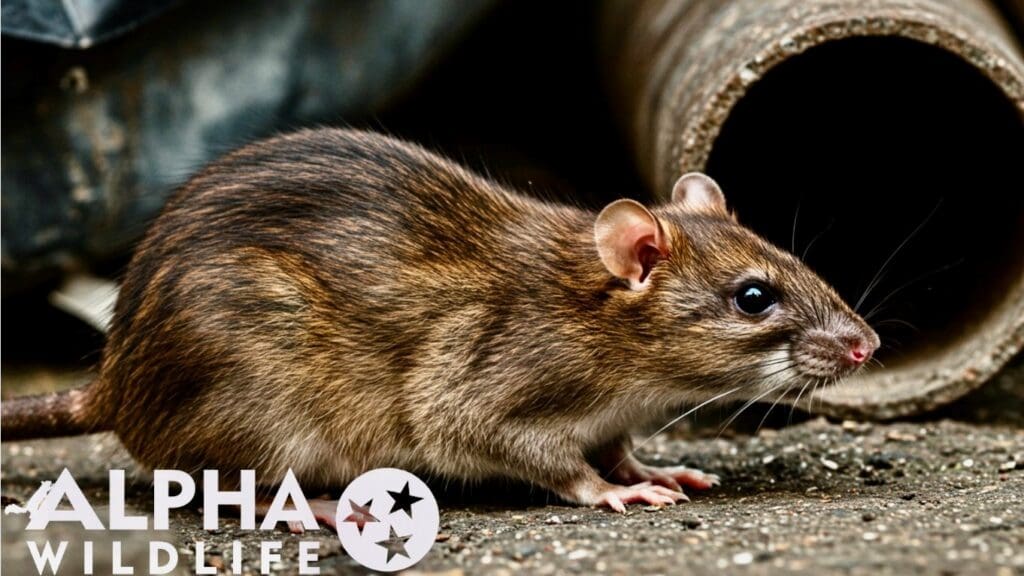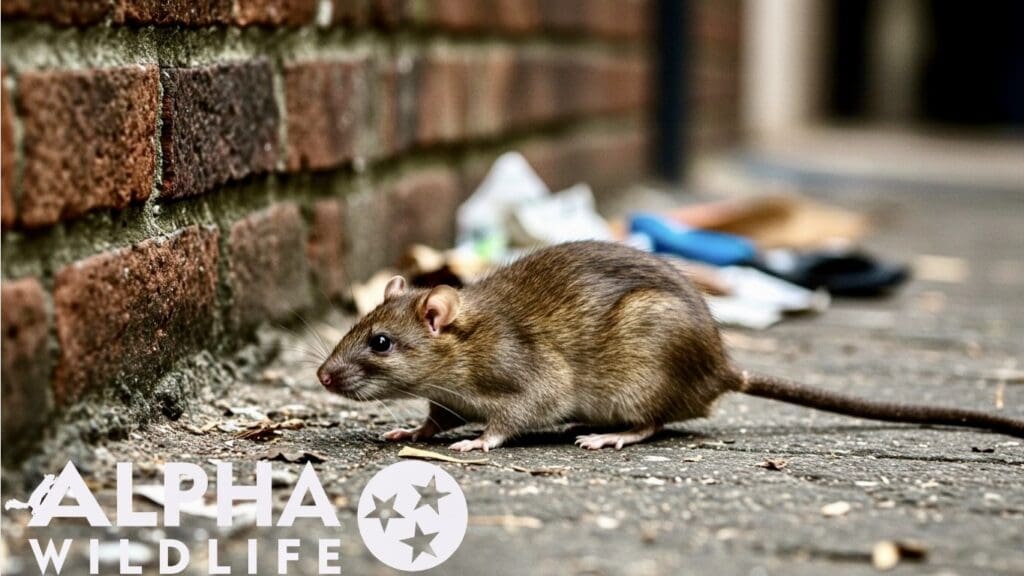Alpha Wildlife
Rat, Mice & Rodent Removal in Nashville TN | Humane Rat Pest Control
Need rat removal in Nashville? Don’t let rats, mice or other rodents take over your home and spread harmful diseases to your family.
Get rid of rats today with our rodent pest control services. Call Alpha Wildlife Nashville today to schedule your free rat inspection!

Alpha Wildlife Nashville
Scratching noises in the walls? Rat droppings in the attic? If you’re dealing with rodents in your Middle Tennessee home, Alpha Wildlife Nashville has you covered. Our team specializes in humane rat removal services that Nashville homeowners can trust.
Whether you’re in East Nashville, Brentwood, Franklin, Green Hills, Hendersonville, or Murfreesboro, our certified technicians provide full-service solutions: trapping, exclusion, cleanup, and long-term prevention.
At Alpha Wildlife, we specialize in rat removal and rodent control in Nashville, using humane solutions to protect your home and family. As a veteran-owned wildlife removal company, we are Better Business Bureau Accredited, NWCOA certified, and have over 300+ 5-Star Google Reviews from verified customers.
Don’t wait until a small rodent problem becomes a rat infestation — call our local experts today to schedule your free inspection!

Rodent Species Found in Nashville & Middle Tennessee
Nashville might be the best Bachelor and Bachelorette destination in the country, but it is also a major hotspot for rodent issues. From Spring Hills to Gallatin to Franklin, Nashville homeowners and business owners are no strangers to rat infestations.
The most common rodents in the Middle Tennessee area are the House Mouse, the Brown Rat, and the Roof Rat.
- House Mouse: These small pests can easily gain access to your home. They are known to hide inside your walls, attic, and basements.
- Brown Rat: Also called Norway Rats, these critters are larger than mice, but have a short tail. However, brown rats tend to hide crawlspaces, basements, and sewers across Davidson and Williamson Counties.
- Roof Rat: Also called Black Rats, they tend to nest in attics and rafters. As excellent climbers, they find it easy to get into homes and businesses in areas like Belle Meade and Sylvan Park.
Not only will these rodents chew through the electrical wires, rats and mice can reproduce quickly and easily spread diseases like the Hantavirus, Leptospirosis, and Salmonella.
Needless to say, if you believe there is a rodent in your home, call now for our Nashville Rat Control Services. Ask us about our Financing Services!

Signs You May Have a Rat or Mouse Infestation in Nashville
So, you’ve found some droppings in your panty along with a few bags of chips that have been chewed on? Does that mean you have rat problem in your Brentwood home?
Short Answer: Yes!
Here are warning signs that signal you need Nashville rat control services:
- Scratching or scurrying noises at night (especially in attics or walls)
- Droppings along baseboards, cabinets, or attic floors
- Strong, ammonia-like odor (occurs from accumulated urine, nesting materials, and droppings)
- Gnaw marks on wood, wires, pipes, or food packaging
Mice and rats aren’t going to knock on your front door to announce their presence. They want to give you a surprise visit and they home to stay permanently.
If you notice any of these signs, mice and rats have moved in and, before long, they’ll start growing their little families.
Don’t let your home get overrun by rodents, reach out to Alpha Wildlife Nashville and schedule your free inspection now!

Our Rodent Removal Process for Nashville Homes
Rats and mice are the worst types of houseguests — they’re destructive, unsanitary, and incredibly persistent. Don’t let their small size fool you — it’s time to kick those pests out for good!
Our Nashville rat control services are designed to eliminate the problem and keep them from coming back.
But how do we do it? Well, the houses in Smyrna are different from the houses in Murfreesboro, so we tailor our removal plans based on your specific needs.
Step 1: Comprehensive Rodent Inspection
Our NWCOA-certified technicians carefully inspect attics, crawlspaces, and basements to identify signs of rodent activity (droppings, gnaw marks, and entry points).
Step 2: Professional Mouse Trapping & Rat Removal
Once we know whether you’re dealing with roof rats, Norway rats, or house mice, we set up proven, poison-free traps to remove them quickly and safely.
Step 3: Rodent Exclusion & Prevention
Lastly, we seal every access point and apply advanced rodent-proofing techniques to protect your home long-term. Our goal isn’t just to get rid of rodents — it’s to stop them from ever coming back!
Aside from property damage, it’s important to have rats and mice removed to prevent the spread of diseases to your loved ones.
With our Nashville rat removal services, we’ll get rid of the rats in your house fast and keep you safe while we do it. Call us at (615) 434-5331 to schedule a free rodent inspection!

Rat Exterminator vs. Humane Rat Removal in Nashville?
If you’re dealing with rat infestation in Nashville, you’re probably search for “rat exterminator near me” and I can understand why. You want to get rid of the problem as soon as possible and there must not be a big difference between the two options, right?
Wrong.
Rat and Mice exterminators use poisons and other potentially harmful chemicals to get rid of the rodents. This can be dangerous to your family, pets, and even the environment. Even if the process kills the rats and rodent, it doesn’t stop them from returning.
At Alpha Wildlife Nashville, our certified technicians use approved trapping methods, and they properly seal entry points to prevent future infestations.
The result is a long-term solution that protects your home without putting your loved ones at risk. Next time you plan to search for an exterminator, choose our rodent pest control services instead.

Why Nashville Homeowners Trust Alpha Wildlife for Rodent Control
Dealing with rats or mice is never pleasant, but choosing the right company shouldn’t add to the stress. At Alpha Wildlife, we combine local expertise, certified training, and a commitment to our community to give homeowners the confidence that their rodent problem is solved the right way.
Veteran-Owned & Deeply Rooted in Middle Tennessee
As a veteran-owned business, Alpha Wildlife takes pride in serving Nashville and nearby areas like Franklin, Brentwood, Hendersonville, and Murfreesboro. We’re actively involved in local chambers and organizations, and our team lives right here in the community.
To us, you’re more than a customer — you’re a neighbor we’re dedicated to protecting.
Licensed & Certified Specialists
Our team isn’t just experienced — they’re NWCOA-certified wildlife control experts. We use safe practices that meet or exceed Tennessee’s regulations.
With Alpha Wildlife, you’re getting Nashville’s most dependable choice for long-term rodent control.
Transparent Pricing & Tailored Strategies
Every rodent issue is unique, so our solutions are never one-size-fits-all. After a detailed inspection, we provide straightforward pricing and a customized plan that addresses your specific home and situation.
When it comes to rodent removal services in Nashville, there’s no one who does it better. Just honest, results-driven service.
Schedule your free inspection today and see why so many Nashville homeowners trust Alpha Wildlife for their rat control services.

Rodent & Rat Removal Services Across Greater Nashville
We proudly serve homeowners across Davidson County and all of Middle Tennessee, including Antioch, Belle Meade, Berry Hill, Brentwood, Clarksville, Donelson, Forest Hills, Franklin, Gallatin, Goodlettsville, Green Hills, Hendersonville, Hermitage, La Vergne, Lebanon, Madison, Juliet, Murfreesboro, Nolensville, Oak Hill, Old Hickory, Smyrna, Spring Hill, Springfield, & White House.
No matter where you live near Nashville, Alpha Wildlife is just a call away!
Rat, Mice & Rodent Removal Nashville TN – FAQs
Q: How much does rodent removal cost in Nashville?
A: Every home is different. After a free inspection, we’ll provide a transparent quote based on infestation size, access, and repairs needed.
Q: What’s the difference between rats and mice in Nashville homes?
A: Rats are larger, more destructive, and often burrow. Mice are smaller but reproduce quickly and sneak through tiny gaps. Both require professional control.
Q: What’s the difference between a rodent exterminator and humane rodent removal?
A: Exterminators use poisons and harmful chemicals, which could impact your family or pets. Humane rodent removal uses approved trapping methods as well as proper exclusion techniques that prevent the rodents from returning.
Q: How fast can you remove rats or mice from my Nashville home?
A: Most infestations are resolved within a few days, depending on severity. After your free inspection, our team provides a clear timeline tailored to your situation.
Q: Will rodents come back after removal?
A: Not with our process. In addition to humane trapping, we provide full rodent exclusion services — sealing entry points and preventing future infestations.
Q: Are your rodent removal methods safe for kids and pets?
A: Absolutely. We never use harmful poisons. Our traps and exclusion techniques are designed to keep your family, pets, and property safe.
Q: Do you offer rodent cleanup and damage repair?
A: Yes. After removal, we clean droppings, sanitize nesting areas, and can repair insulation and wood damaged by rats or mice.
Q: What is your service area in Nashville for rat, mice, and rodent removal?
A: Alpha Wildlife Nashville services the following areas around Nashville: Antioch, Belle Meade, Berry Hill, Brentwood, Clarksville, Donelson, Forest Hills, Franklin, Gallatin, Goodlettsville, Green Hills, Hendersonville, Hermitage, La Vergne, Lebanon, Madison, Juliet, Murfreesboro, Nolensville, Oak Hill, Old Hickory, Smyrna, Spring Hill, Springfield, & White House.
Call for a Free Rodent Inspection in Nashville
Rats and mice can quicky take over your home if you don’t act fast! Alpha Wildlife offers the most trusted rodent removal services in Nashville.
Call today to schedule your free inspection and reclaim your home from unwanted rodents.

